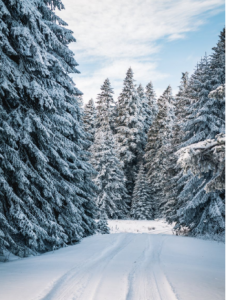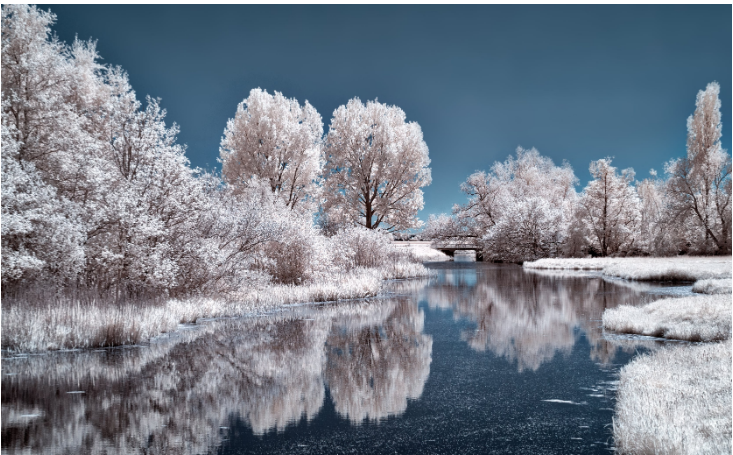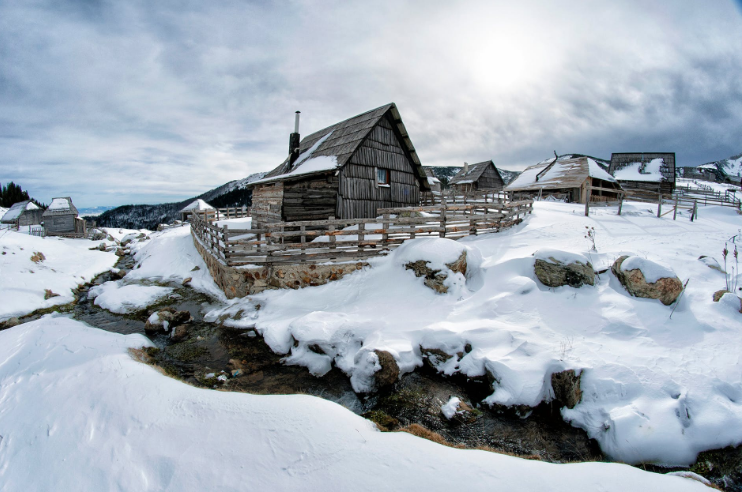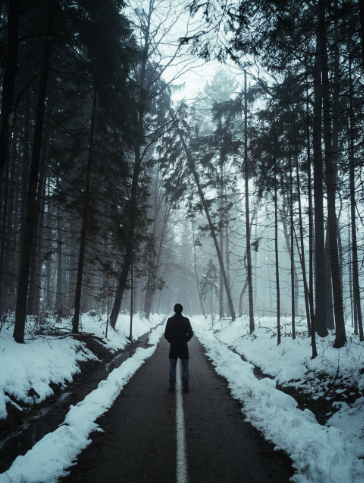February 2020
 Having spent the greater part of the last 10 years either in the Middle East or in the tropics I’ve managed to escape the rigors of winter for a good while. That’s exactly what I wanted, since winter is no friend of mine. I grew up with it in my corner of the Bitter North and remember only too well below-zero temps in January and snow so deep we had paths between the house and the barn that seemed more like tunnels. I also have clearly present in mind memories from my four years spent in the backwoods on the family property in my middle age. Winter involves a lot of waiting, that’s my major objection to it. One waits for the return of the leaves and the flowers. One waits for the ability to take off walking across the countryside in any direction. The winters in the Bitter North are long and it’s impossible to predict their course. And so one waits, and waits, and waits …
Having spent the greater part of the last 10 years either in the Middle East or in the tropics I’ve managed to escape the rigors of winter for a good while. That’s exactly what I wanted, since winter is no friend of mine. I grew up with it in my corner of the Bitter North and remember only too well below-zero temps in January and snow so deep we had paths between the house and the barn that seemed more like tunnels. I also have clearly present in mind memories from my four years spent in the backwoods on the family property in my middle age. Winter involves a lot of waiting, that’s my major objection to it. One waits for the return of the leaves and the flowers. One waits for the ability to take off walking across the countryside in any direction. The winters in the Bitter North are long and it’s impossible to predict their course. And so one waits, and waits, and waits …
Yesterday something touched my present that I can recall only from the distant past. It’s a particular experience that was called today vividly to mind and links my present moment to a past that seems to me at my current age almost mythically remote. In the memory I am a young man, late teens or early twenties at most. I’m standing on the road leading from the family home to the county road — a distance of about a quarter-mile. The entire landscape is white and I’m bundled up headed to some destination I don’t remember. I remember only one thing in that winter scene: the Chinook.
I stand perfectly still in that vast whiteness feeling a warm wind on my face. It’s like the light touch of a hand, like a caress. I stand with my eyes open, feeling the wind on my face as I’m transfixed by the sensation. It’s the eruption of a completely different reality into my experience of the moment. The wind is warm against my cheeks and forehead. It carries a scent of its own, a fragrance of melting snow. In that instance winter becomes something entirely other. It ceases to be something one deals with under duress and becomes a transition to the return of life, to Spring.
The Chinook started last night. I was busy working downstairs and heard things fluttering about outside. We so rarely have wind here worth any special notice that my attention was piqued but not enough to prompt any nocturnal investigation. Temperatures have been mild over the past week — unseasonably so, in point of fact — so I thought it just a spot of bluster in what has been a stretch of wet weather. But when I opened the blinds this morning I saw the patio lay bare before me that two weeks ago presented to view a seamless white over a foot deep. A look out the windows at the front of the house revealed patches of lawn showing here and there where a few days before there had been only the blank stare of snow. Suddenly it dawned on me: the Chinook has come.

My reaction to it 40-odd years after the instance I described above was no less full of surprise but lacked the full sense of transfixation because I’m coddled in a suburban setting now, not out in the boondocks exposed to the elements because the ice has to be chopped off the watering trough for the horses. I think the reduced level of rapture is fair enough trade for the increase in creature comfort. 🙂 And in my old age I have both the time and the curiosity developed over decades to approach the phenomenon from a standpoint of understanding rather than raw experience. I will own that the experience I had as a young man is what I would call a “peak experience,” one that imprints itself and carries along through the years without suffering any of the diminishment to which memories are usually susceptible. Even after long decades I can put myself back into that experience without losing any detail of what it was I experienced. That wind is no longer caressing my face and the fragrance of the melting snow is no longer in my nostrils but memory still serves well to echo the experience, so strong was its impression when it occurred.
A lot of life has happened since my experience as a young man feeling the warm wind on my face. That fact is perhaps no more clearly shown than in my reaction yesterday on seeing the effects of the Chinook on the patio and the front lawn. The word that came to me was not “Chinook.” What went through my head was, “Das ist der Föhn.” Yes, Bridget, there I go talking like a damned ferener again, I quite realize. In the interest of accuracy in reporting, however, the words must stand as they are.
Since being the young man standing in the wintry landscape while the warm wind envelops him I’ve spent many years focused on European landscape and literature, to the point that our young man standing on the road is less vivid a memory than the Chinook itself, however strange that may be in the recounting. The word Föhn would not have occurred to him. As I remember carefully I see that no word came into his mind — at the moment of the experience words were beside the point. Whatever the name we humans give to such a wind had absolutely nothing to do with the reality it brings to bear. That’s still as true now as it was all those decades ago.
But something in my subsequent experience shifted my alignment with the Chinook and transformed it into the Föhn. I’ve recentered myself, from the Bitter North of the western United States to the Alps. How could that have happened? The answer isn’t far to seek. It’s as easy as falling off a log to imagine myself as a young man standing on some slope of the Alps in Switzerland or Bavaria feeling a warm wind caress my face. If you look for capture of the reality of that wind in words — which are, let us remember, the stock and trade of human experience — you’ll find far richer a treasure trove in German than in English. As I prod the name “Chinook” to discern its associations I find a hodgepodge of concepts gathered from here and there willy-nilly with no real core to it. Where did the name come from? It’s obviously not an English word but instead a modification of some word from a Native American language, as are so many names in the USA. What associations native to a white person — a settler — could the word have had back in the day? In my day as the young man I was the name had no associations of any special import, which stands in horrible disjuncture with the beauty and importance of my experience of the phenomenon. The English name dangles like the relict of some grammatical short-circuit of translation from a language in which I have no doubt the word did mean something special. If you’re sitting in a teepee up to your patoot in snow then the warm wind from the mountains will be as much a Big Deal as it was for me that day I experienced it as a young man, perhaps even more so.
Research provides paltry amounts of information about the origin of the English word. Here’s a bit from accuweather.com (here):
The term Chinook is derived from the Native American people who lived in the geographical area from where the wind originates. The Chinook people lived in the vicinity of the Columbia River, which forms the present-day boundary of Washington and Oregon. However, often the brute force of the Chinook wind is not realized until the air flows hundreds of miles farther to the east and over the Rockies.
I am barely edified and certainly not moved by this snippet of information. That may be a “duuh” moment since it comes from a meteorologist, not a poet, but all the same, there should be some resonance of so wonderful a experience in the name itself. That is exactly the circumstance with the word Föhn in German-speaking lands. If you say Föhn you’ll see eyes light up. The same can’t be said of the word “Chinook,” I’m sorry to relate. Something massively significant has been lost in its translation.
The following info from National Geographic (here) improves the situation a slight bit:
In the winter, the onset of a Chinook can cause amazing temperature changes, bringing a warm breath of spring into the coldest of winter days. The Chinook wind was referred to by First Nations people as the “Snow Eater” for its ability to erase a blanket of winter snow in a matter of days. Temperature changes during a Chinook are very dramatic, often rising more than 20 degrees Celsius in a matter of hours.
There at least we have some idea of the semantic sense of the Native American name for the wind. The term “Snow Eater” has absolutely nothing about it that bears similarity to the semantic envelope of the word Föhn. If you know German you’ll see straightaway that I’m not making up fairy stories. If you don’t, you’ll just have to take my word for it. “Snow Eater” sounds archetypal — in addition to being typically literal, a forte of Native American names — but the semantic envelope leaves me unsatisfied because it includes nothing of the human experience the wind brings to us two-legged critters as we stomp through the bleak whiteness. To my Anglo-Saxon mind it has an anthropomorphizing effect, which may not have been the case for the Native Americans who used the term. Say “Snow Eater” to me and I imagine straightaway some enormous Sasquatch lookalike who stomps over the landscape hoovering up snow into some gaping, dark maw. It’s an image for the Cartoon Channel, not for rendering the emotional experience the wind brings.
So no wonder the word that occurred to me yesterday wasn’t “Chinook.” The word that spontaneously came into my head was Föhn, which does indeed have in its semantic envelope associations with the experience of the wind. Obviously, literature from the Alpine regions of the German-speaking lands will have mention of it, as indeed is the case. The name of the wind occurs in German literature always in conjunction with human experience and life situations, never as a purely meteorological phenomenon under scientific investigation. The Föhn is mentioned because it means something significant in human experience. That’s the reason the German word has supplanted the English one in my head.
When I think of the word Föhn the last thing on earth I think of is a Sasquatch lookalike. I think instead of Alpine landscapes with craggy, rocky peaks on the horizon. I think of tightly grouped wooden houses in a German or Swiss village, their eaves sporting gingerbread carvings, their roofs piled high with snow and the yellow lights of candles showing in the windows of an evening. I think of cows munching hay in a manger, of goats with their bells tinkling as they scamper along the paths between the houses. I also think of people looking up from their work with their eyes lit up when the warm wind caresses their faces.

A host of examples from German literature springs to mind in which the Föhn would find a natural place. Take, for example, the story by Adalbert Stifter entitled “Bergkristall” published in 1845 in the collection of novellas Bunte Steine. It’s the perfect setting for a depiction of the Föhn, although the wind doesn’t figure in the story. Here’s a description of the tale from its Wikipedia page (here):
Rock Crystal (German: Bergkristall; 1845) is a novella by Austrian writer Adalbert Stifter, about two missing children on Christmas Eve. It influenced Thomas Mann and others with its “suspenseful, simple, myth-like story and majestic depictions of nature.” Mann said Stifter is “one of the most extraordinary, the most enigmatic, the most secretly daring and the most strangely gripping narrators in world literature.” Poet W. H. Auden called Rock Crystal “a quiet and beautiful parable about the relation of people to places, of man to nature.”
The relation of people to places, of man to nature — there’s the kernel of the experience I had as young man standing on the road with the warm wind caressing my face. That the Chinook of my youthful experience has been overlaid by the Föhn has to do with language as a reflex of experience. Had I been born in the Himalayan region and experienced the warm wind from those mountains I would doubtless have a different word available to describe the phenomenon. The phenomenon is unitary despite the many variations in human language to name it.
Language is a house we humans inhabit. Nature has no need of reflexes, it is itself the experiential bottom line. My experience as a young man was more elemental because it bypassed language entirely. I thought of no words then, I was given over entirely to experience without the need for language. In a certain sense that earlier experience is even more authentic than the one I had yesterday with its intervention of language as a defining element. To borrow a phrase from Shakespeare (who being English would no more know what a Föhn is than fly to the moon), a Chinook by any other name would feel as warm. In point of fact, a Chinook by no name at all would feel as warm.
I think the younger me has the lesson to teach here. The direct experience he had was an instance of physical connection to the physical world, unembellished and unencumbered by aspects of human culture. In the same sense of the Biblical “I Am That I Am” the experience required no language and the human awareness associated with it was reactive, not proactive. The emotional response was of a physical being to a physical phenomenon in its environment — the same as that of any other animal in the final accounting.
But do deer in the woods feel joy or relief when the Chinook comes? They’ll never tell, but I think it rather likely they do not. What I felt that day so long ago when the Chinook caressed my face was relaxation and hope. Only after being in places where winter never comes did I realize how tense the body — my body in any case — becomes with the onset of winter weather. My body is always hunkered down to protect itself from what’s going on outside. Instead of lounging outside in short sleeves it’s time to start layering clothes that you never really get out of until the warm weather comes again. How very dreary. I think the bears got it right — it would be far better just go to sleep before the snow flies and wake up when it’s time for the flowers to bloom again.
The Chinook — or, if you’ll indulge me, the Föhn — is the one instance in the winter when Nature gives the gift of a foretaste of Spring. The warmth and the smell of melting snow will come again toward the end of March or early April. To receive a foretaste of that hotly desired change is to find the body momentarily relaxing into the new season. I don’t remember the young man I was being aware of that particular element of the experience, but it figured as one of the hallmark elements in the experience my much older bones had yesterday. I felt some tightness in my physical self unwind and when I stepped outside I felt the air touch my body without the astringent effect of a temperature that no body thinly covered could find comfortable. My feeling at that moment was, yes, there is a light at the end of the tunnel, and it’s not too much longer in coming.
So for my own purposes I will in future set aside all the names I know for that warm wind of winter and make up my own: Breath of Hope. That seems far better a name to me than any other I know for it. I’ll carry that new memory with me until the days lengthen and the snow begins to recede with certain knowledge that the Planet will keep the promise it made. It always keeps its promises.

